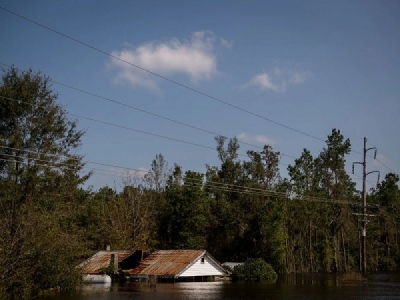
Posted on October 3, 2018
Dan McCready is a boyish ex-Marine, a solar energy entrepreneur and a favorite candidate of national Democrats hoping to nab a Republican seat in their battle for the House.
His company, Double Time Capital, says its mission is to hasten “our country’s important transition to clean energy” because of climate change.
But as a candidate in a conservative-tilting battleground district, Mr. McCready’s environmental message is much more muted. Climate change is not directly named among 13 top issues on his website. And though his latest TV commercial features solar panels and boasts that the 35-year-old, first-time candidate helped make North Carolina a leader in solar power, the ad highlights Mr. McCready’s ability to balance a budget and meet a payroll. It does not mention “environment” or “climate change.”
In an election year that has included alarming portents of global warming — record wildfires in the West, 500-year floods in the East, a president walking away from a global climate accord — the one place that climate change rarely appears at all is in the campaigns of candidates for the House and Senate.
ADVERTISEMENT
The vast majority of Democrats and Republicans running for federal office do not mention the threat of global warming in digital or TV ads, in their campaign literature or on social media.
Environmental activists and political scientists say it is a reflection of the issue’s perpetual low ranking among voters, even Democratic voters, and of the intense polarization along party lines that has developed around global warming, even as the science of human-caused warming has become overwhelming.
For scores of Democrats running in reddish districts and hoping to win a majority in the House, and for Democratic Senate candidates running in states President Trump won, highlighting climate change risks handing conservative voters a motivating issue to turn out against them.
Image
Dan McCready, the Democratic nominee for North Carolina’s 9th Congressional District, which is currently represented by a Republican. He is a solar energy entrepreneur, but he isn’t running hard on environmental issues.
Credit
Travis Dove for The New York Times
The contradictions were highlighted in Mr. McCready’s district as Hurricane Florence tore through its eastern end in September. The storm delivered devastating floods after dumping 20 to 35 inches of rain, which scientists said were likely 50 percent heavier because of warmer ocean temperatures and more atmospheric moisture due to climate change.
ADVERTISEMENT
Mr. McCready and his Republican opponent, Mark Harris, who rejects established climate science, each rushed to deliver food and emergency supplies to the hard-hit city of Lumberton, in one of the poorest counties in the state.
As flooding forced many from their homes, most residents pointed to more tangible culprits than the climate: the failure to dredge the Lumber River; a gap in the city’s levees.
“The climate and stuff, that’s God’s work,” said Rodney Locklear, a 62-year-old forklift driver, whose home was one of the few on Canal Street not made uninhabitable by the rising waters. “If man was in control of the climate, he’d have a grudge against someone and hell, he wouldn’t give him no sun — wouldn’t give him no rain, no wind.”
In polls of voters’ top priorities, climate change rarely garners more than 7 to 10 percent, trailing health care, jobs and immigration. For a passionate core, it resonates. But to the enduring frustration of environmental activists, that core has proved limited. Among Democrats, 45 percent said health care was the issue they most wanted the party to tackle if it regains power in Washington, according to a survey this year by Civis Analytics. Climate change was far below, at 7 percent.
“Until voters in the U.S. perceive this as a quite imminent threat, it’s liable to remain mired in the middle of all the other issues,” said Jeff Nesbit, the executive director of Climate Nexus, a group seeking new ways to communicate the threat of climate change, and the author of a recent book, “This Is the Way the World Ends.”
According to an in-house database compiled by Climate Nexus on 161 potentially competitive House races, only a small handful of candidates have released TV ads or online videos prominently featuring climate and energy issues.
Source: The New York Times





